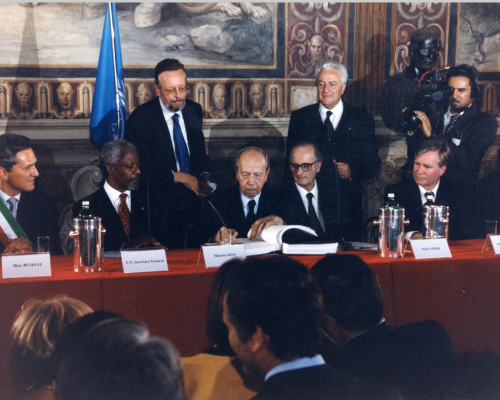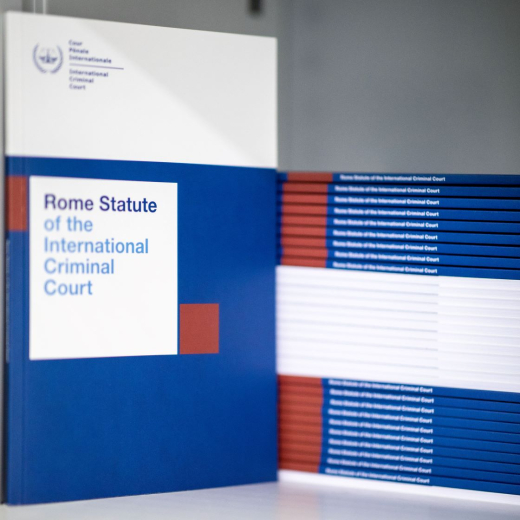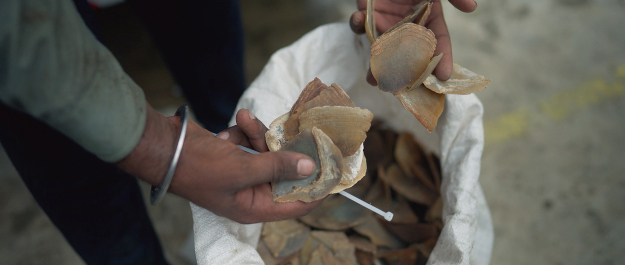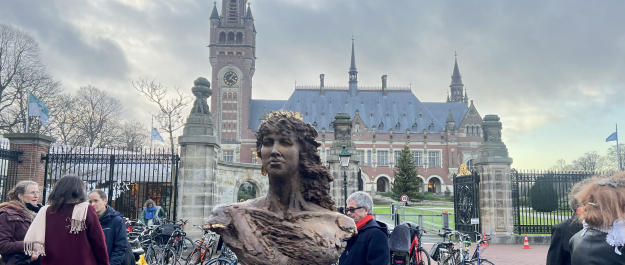The International Criminal Court and the city of The Hague commemorate the 25th anniversary of the Rome Statute.
25th Anniversary of the Rome Statute
On July 17th 2023, the International Criminal Court (ICC) in The Hague will mark the 25th anniversary of the Rome Statute - its founding treaty. For the ICC it is a time to reflect on some of its groundbreaking and globally significant work. But for the city of The Hague, too, it is a chance to celebrate its position at the very heart of international justice, and its reputation for peace and justice that is recognised all over the world.
The Rome Statute has made it possible for the international community to stand together against war crimes and genocide. Created as the world’s first truly independent court, the ICC is empowered to investigate and, where appropriate, prosecute individuals charged with some of the gravest crimes imaginable. With the backing of more than 120 countries, the ICC brings international accountability to criminals, justice for victims, and, crucially, helps forge a path to stability and lasting peace.
What is the Rome Statute?
The Rome Statute is the treaty that established the International Criminal Court (ICC). It was adopted at a diplomatic conference in Rome, Italy on 17 July 1998 and entered into force in 2002.
The ICC was created to investigate and prosecute four core international crimes that cannot be adequately or objectively handled by single sovereign states. They are:
- Genocide
- Crimes against humanity
- War crimes
- The crime of aggression
Over the last two decades, the ICC has heard cases involving murder, rape, attacks on civilians, attacks on cultural heritage, the use of child soldiers, and other atrocities. To date, the Court has carried out 17 investigations across 4 continents. It has tried 53 defendants in over 30 cases, holding over 2,500 hearings, and giving voice to more than 10,900 victims - around a quarter of whom received Court-ordered reparations.
Assembly of States Parties (ASP) photo exhibition
The ASP is hosting a photography exhibition for the anniversary called “Common bonds: From the Rome Conference to today” at the Atrium Den Haag in The Hague's City Hall, from 11 - 31 July 2023. The exhibition brings together survivor stories from all 17 cases investigated to date by the ICC, with a particular focus on the people affected. The stories have many common threads: they are personal experiences of unimaginable violence, harm and loss. But they are also stories of love, friendship, family, home, connection, community, and hope. The exhibition also reflects on the impact of the work of the Court, the Trust Fund for Victims, and the Rome Statute System, 25 years on.
“In July 1998, the Court was an idea yet to be realized. Twenty-five years after its creation, the hope is that more states will join this historical effort to maximize its potential to impart justice in our tumultuous world.”
The Hague: A city synonymous with peace and justice
Even before the Rome Statute and the conception of the ICC, the city of The Hague in the Netherlands has a long history as the world’s legal capital. For centuries, it has provided a safe haven to institutions and human rights defenders working to achieve justice and uphold the rule of law.
Jurist Hugo Grotius wrote his book Mare Liberum (The Freedom of the Sea) in The Hague in 1609, which forms the basis for modern international law, while 17th-century philosopher Baruch Spinoza, known for his fundamental ideas on peace and freedom, spent the final years of his life living and working in The Hague.
International Criminal Court in The Hague
So, the city takes great pride in hosting the ICC, and has welcomed the Court’s significant contributions to the development of international criminal law as a whole. In particular, the ICC has ensured that the voices of survivors and family members of the most heinous of war crimes have been heard, while its work has inspired countless law students around the world to get involved in the field of international law.
But it is important to acknowledge that this 25-year milestone is just the beginning. There is still a lot of work to be done for the ICC as well as the other international courts and tribunals that operate in The Hague. Many victims of war crimes are yet to have their voices heard. The ICC and its partners can continue to count on the full support of the Municipality of The Hague during the next phase of their journey in the pursuit of international justice.
Mariëlle Vavier
“In drawing up the Rome Statute, the international community sent a momentous signal: that it is serious about ending impunity for the perpetrators of large-scale atrocities. We must never forget that the victims of war crimes and crimes against humanity are always individuals. Women, men, children. Their voices must always be heard, and The Hague is fully committed to helping the ICC in whatever way it can.”
Mariëlle Vavier
Alderman for Poverty, Inclusion, Healthcare and International Affairs.
Trust Fund for Victims
Trust Fund for Victims
Though the Trust Fund for Victims is separate from the Court, it was created in 2004 by the Assembly of States Parties, in accordance with article 79 of the Rome Statute. The Fund's mission is to support and implement programmes that address harms resulting from genocide, crimes of humanity, war crimes and aggression.
Rome Statute
25th Anniversary of the Adoption of the Rome Statute








